Five Slices #24: I See Fire
The musician terrorist, Hemingway Effect, the anonymous hero, Gell-Mann Amnesia, Vesuvius Explodes
Welcome to Five Slices! If you’re new here, I share five stories every week from art, culture, science, business, psychology, and history. Subscribe to get it in your mail:
Here’s the complete archive of posts.
From blues music to bullets
What I miss most about college is the music. Fresh music pervaded the air, in the canteens, empty classrooms, the hallways of our hostels. Sometimes people would drop into strangers’ rooms playing music they liked, becoming friends by the end of the hour. My range in music was limited, but my friend Narayan had the most original taste in music of anyone I ever knew. We had become roommates accidentally, one of the best accidents of all time. Every week he would recommend a band wildly different from the last week’s suggestion – Simon and Garfunkel, El Condor Pasa on pan pipes, Sufi music, Carnatic fusion rock, Hang drums, ballads… And I looked forward to what he would find next.
One such find was the desert blues band Tinariwen from Mali/Algeria in Africa. In their song Iswegh Attay (which means “I drank some tea”), they sing a calming tune as tea simmers over glowing coals. We loved this song. We didn’t understand a single lyric but it would run in the background and we would hum along.
Last week I discovered a bizarre story: Tinariwen’s lyricist Iyad ag Ghali had left the band to make a career switch. He became an Al Qaeda warlord, banning music in Mali, ambushing his own band members, abducting his guitarist friend, and eventually commanding an army of 6,000 extremists that led to tens of thousands of deaths. How does a man move from music to mass murder?
Ag Ghali was one of the founding members of Tinariwen and saw his music as political activism. But somewhere along the way, he started diverging from the band – While Tinariwen moved to larger stages, playing with Led Zeppelin and Bono, and even winning a Grammy, Ag Ghali grew interested in Al Qaeda’s ideology. He was finding it hard to balance both roles – as a military activist and a rock star – and he eventually ambushed his own bandmates. At 70, he is now a fearsome leader and a wanted man in Africa.
This ambush happened in 2013. It was in 2014 that Narayan and I were humming along to this song in our hostel rooms, blissfully unaware of the chaos in Africa. It’s a disturbing story, but there’s a small ray of hope: Tinariwen is still together, and they continue to play music, despite all the trauma and terror.
Source: The Honest Broker, WSJ
Note: If I use personal stories or conversations, I always clear it with the people concerned before I publish. Conversations with me are confidential, don’t worry about what you tell me.
The Hemingway Effect
I’ve been reading some short stories by Ernest Hemingway after discovering a series of essays on his craft. If you like reading or writing, check out Part 2 and Part 3. (Part 1 is good but it’s mostly hero-worship of Hemingway). Part 3 is about Hemingway’s influences: Writers, poets, explorers, and painters – for example, he learned to describe scenery by studying Cezanne’s paintings. Writer Russell Banks describes this as “the logic of the eye.”
Look at the physical description, how he moves from background to foreground. It’s the logic of the eye. It’s not the logic of the paragraph. And it’s not the logic of exposition. It’s the logic of the eye.
When I reread the “The short happy life of Francis Macomber,” I saw this in action everywhere. Here’s a sentence where a scenery unfolds:
So they sat there in the shade where the camp was pitched under some wide-topped acacia trees with a boulder-strewn cliff behind them, and a stretch of grass that ran to the bank of a boulder-filled stream in front with forest beyond it, and drank their just-cool lime drinks and avoided one another's eyes while the boys set the table for lunch.
And here’s another where he completes an entire scene in a single sentence:
In the orchard bush they found a herd of impala, and leaving the car they stalked one old ram with long, wide-spread horns and Macomber killed it with a very creditable shot that knocked the buck down at a good two hundred yards and sent the herd off bounding wildly and leaping over one another's backs in long, leg-drawn-up leaps as unbelievable and as floating as those one makes sometimes in dreams.
Hemingway’s rival Faulkner criticized him for “never using a word that will make a reader reach for a dictionary,” that his words were too simple and he never took a risk. But his simplicity is deceptive – his clean sentences have a cinematic logic to them, easy to read but very hard to imitate. (I’ve tried and failed. It’s easier to ramble).
The same Faulkner respected Hemingway for his absolute commitment to his craft. Hemingway wrote every day, and he did this by making it easy on himself. He set a low bar of 200-500 words, never pushing himself too hard. But his special trick was to stop when the going was good. He would write for a set amount of time, and stop at the most exciting part when he knew what would happen next. For the next 24 hours, his mind kept mulling on the story in the background – in the shower, on his walks, when he was drinking – and he never had to return to every writer’s nightmare of starting from a blank page. He just had to pick up from where he left off.
This “Hemingway effect” has been studied by researchers, and it doesn’t apply just to writing. Stopping a task midway when you know what you need to do next lets you process it in your subconscious mind, and the chances are that you’ll return to the task with higher motivation. In contrast, if you exhaust yourself by pushing yourself to the brink of your energy, the task will seem like an unpleasant chore.
Also see: The Zeigarnik effect, Paul Thomas Anderson on not starting from a blank page
The anonymous guy who saved the stock market
While I’m writing bizarre stories here on my newsletter, our main newsletter Market Sentiment is seeing a spike in interest: because the US stock market is in turmoil. President Trump declared large-scale tariffs on a number of countries. Ironically, US businesses are the worst affected by this. So much of their production and supply chains are outsourced to other countries. In just 16 minutes, the US stock market fell by 4% and lost $2 Trillion in market cap. Over the next few days, the dip in the US market was equal to the size of the Indian stock market.
But yesterday, the US market went up by 4% – more than $4 Trillion – in just a few minutes, and nobody knew why. The news on the streets was that tariffs were being paused for 90 days for negotiations. Markets were celebrating. But after a while, markets dropped again.
Here’s what happened: An anonymous guy named Walter Bloomberg read a news article from Reuters and tweeted that tariffs were being paused. His account is pretty big. So other news outlets like CNBC started reporting that tariffs were being paused, based on Walter’s tweet. Meanwhile, Reuters retracted the original article because they later found it was incorrect. After a while, the White House came back and made an official statement saying they have no clue what news outlets are talking about. Markets collapsed again.
An anonymous guy with a Twitter account just lifted up the stock market for a few glorious minutes. Memes be meming. We now live in the theater of the absurd.
Source: TechCrunch
De-extinct wolves and distorted claims
The dire wolf was a species of large wolf that roamed North America more than 10,000 years ago before it went extinct. These beasts were the inspiration for the Direwolves in the series “Game of Thrones”:
Yesterday, this headline popped up in my feed: “Scientists say they have resurrected the dire wolf.” The article covered Colossal, a biotech company working to resurrect extinct animals like the Woolly Mammoth. The headline got me thinking: What’s next? Jurassic Park?
My friends who work in research have taught me to be a little skeptical. So I went to the only credible news source – Reddit – and read what other researchers had to say. The “resurrection” claims weren’t exactly false, but it looks like some details were intentionally distorted. The scientists had edited the genes of gray wolves to create a new species that resembled what they thought a dire wolf would have looked like. But of course, that isn’t as catchy a headline.
This is a recurring pattern:
Tech gurus claimed that crypto was the next financial revolution. 17 years in, I still don’t use any crypto products.
AI was touted as life-changing. While it’s definitely incredible as a tool, it hasn’t cured cancer or solved millennium problems or unlocked creativity as claimed.
Microsoft unveiled a chip called Majorana–1 which they claimed was a leap forward in quantum computing. A month later, the data they revealed in a conference was received with muted excitement. The promises seem much bigger than the substance.
Why does this happen? The problem is at three levels: Companies are jumping the gun and making tall claims (if they were that close to revolution, why not wait for revolution and let the results speak for themselves?). The media isn’t checking facts. Consumers aren’t being skeptical enough. In the worst case, this leads to scandals like Elizabeth Holmes’ Theranos. Here’s why this happens:
Companies have FOMO. They need to raise funds and attract the brightest talent. If their marketing is based on incremental advances, they might not be desirable enough for the next generation of brilliant scientists to join. (But if your scientists can’t even figure out that your claims are false, are they that brilliant?)
The media wants a viral story. In most cases, they’re working on tight deadlines and are under pressure to be fast, not rigorous. Like Reuters in the previous article, they can retract in the worst case. But by then the damage is already done.
Consumers are a bit different. When you find someone making false claims in the newspaper about a topic you know (your city, your industry, etc.) you immediately recognize that the journalist is clueless or dishonest. But then you turn the page to read a story called “Cancer will be cured by next month” and you believe it, forgetting that the previous page was false just a second ago. You might even forward it on Whatsapp. This is called the Gell-Mann amnesia effect.
The incentive system is so broken that there’s no quick fix for this. But at a personal level at least, you can be a little more aware of what you believe and pass on.
Night of Fire
On the Gulf of Naples in Italy lies Vesuvius. Not all volcanoes are active, and even the active ones aren’t always destructive. Vesuvius is both. In the last 2000 years, it has erupted at least 43 times. But the worst one happened in 79 AD. Vesuvius exploded violently releasing gases, ash, and molten rock into the sky, releasing 100,000 times the thermal energy of the atomic bombings of WWII. It buried the tourist towns of Pompeii and Herculaneum under 6 meters of ash, killing thousands of people.
We know about the horror of what happened that night through the letters of Pliny the Younger, a roman statesman who recorded what happened that night from a distance. His uncle and guardian, Pliny the Elder perished from the toxic gases spewed by the volcano. Pliny the Younger’s record inspired artists who followed him, and they all imagined the night Vesuvius erupted in their own colors:
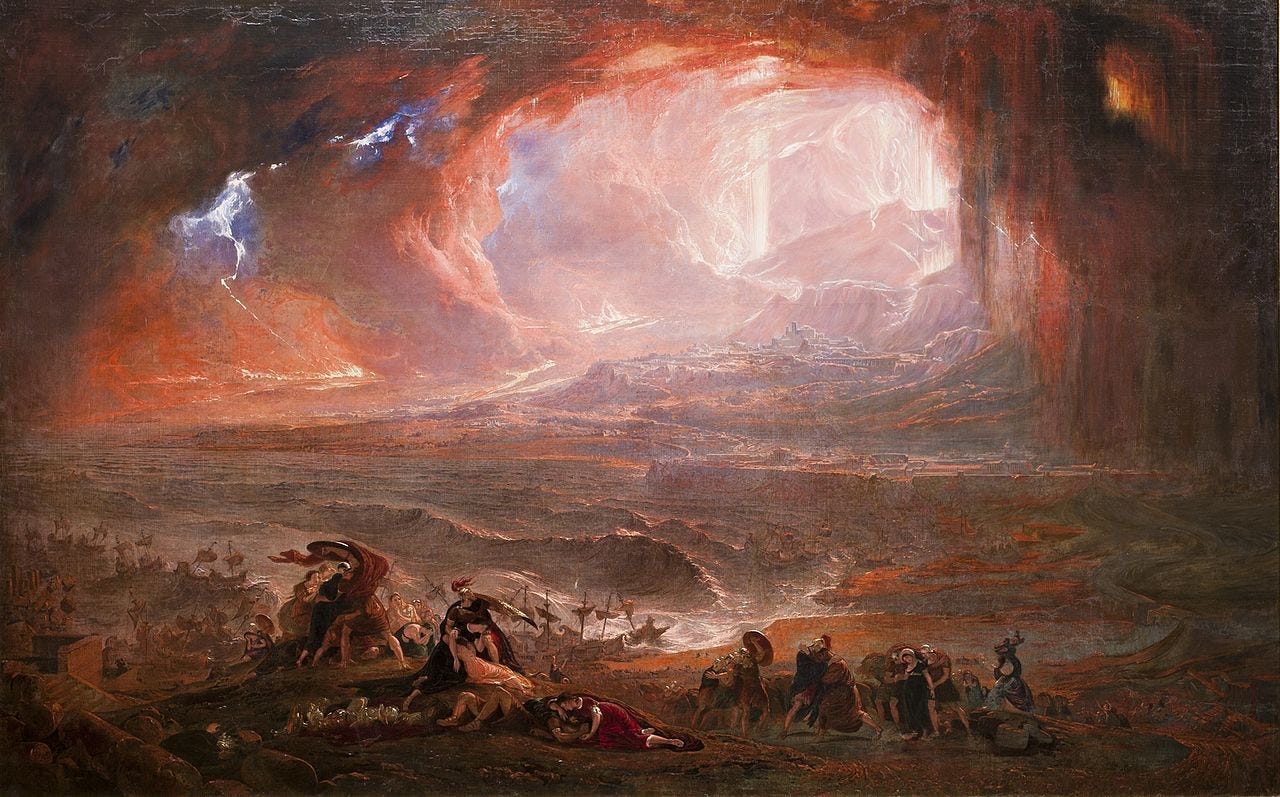
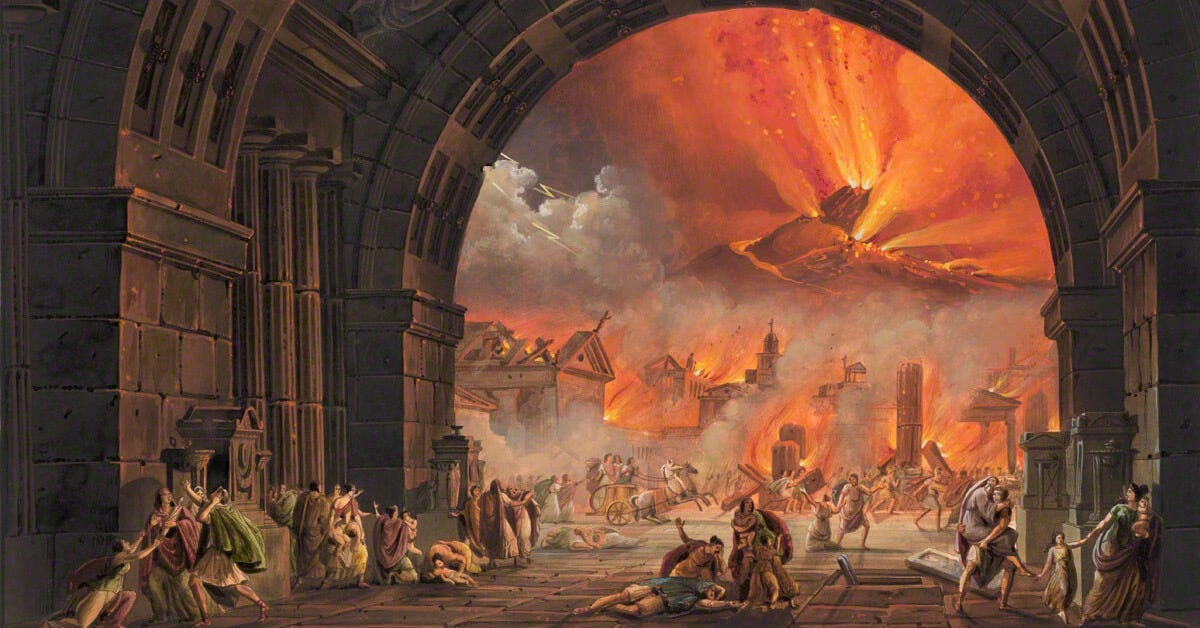
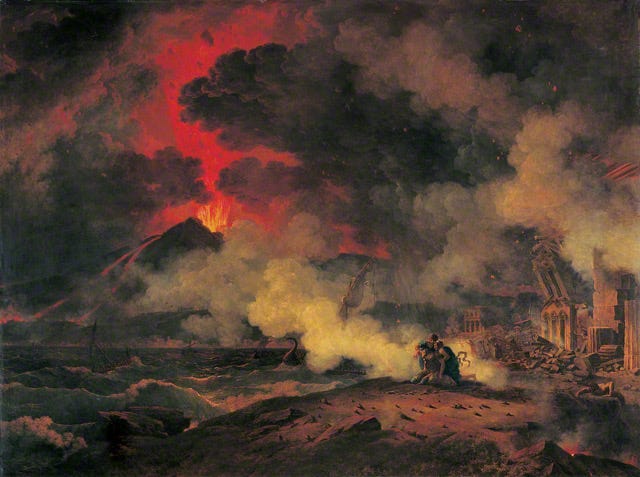


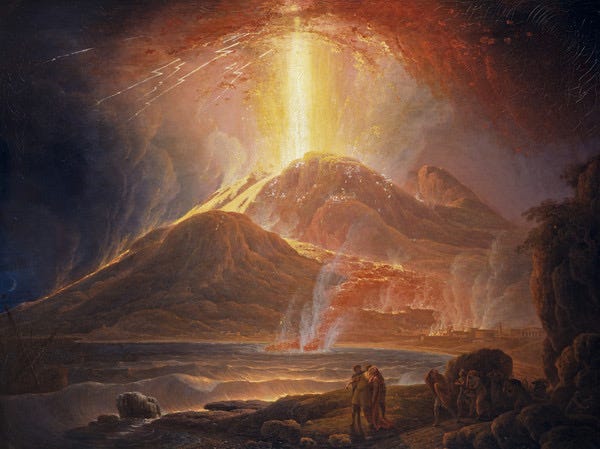
Pierre-Jacques Volaire alone has 22 paintings of the Vesuvius eruption, and they are incredible.
Source: Via this post from
. The title of this post, “I see fire” is a reference to this masterpiece of a song from Ed Sheeran.If you enjoyed reading, hit like and share this post with a friend who might like it:
I’d love to hear your thoughts in the comments. Last week, I wrote about the lore behind your favorite songs. You can find the complete list of posts here.




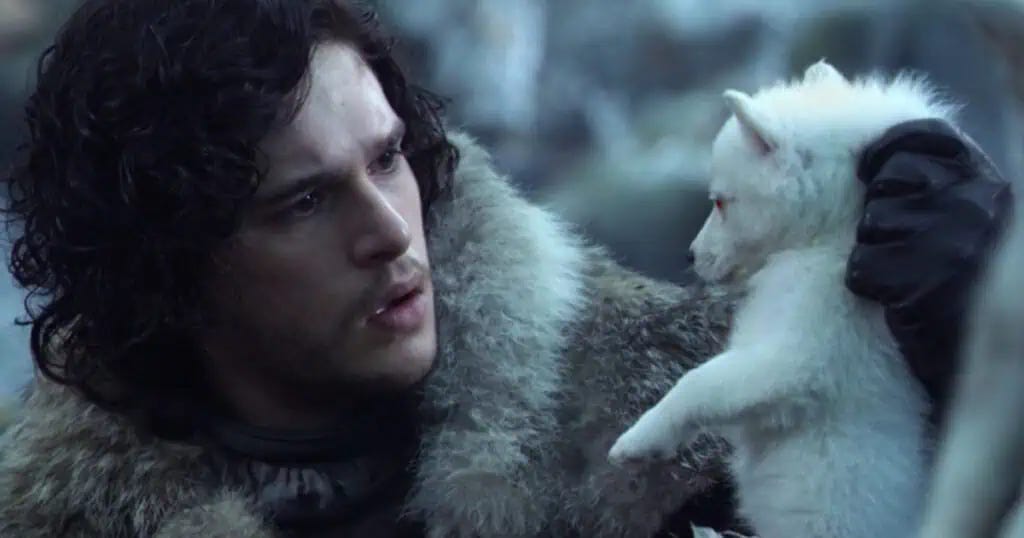
The whole 90-day tariffs pause news that drove the rally yesterday reminds me of the time reddit played ping pong with Gamestop’s stock. If i remember correctly the stock price went up to $450 and crashed back down to $48 because a community within a social network decided so. Crazy times we live in haha. I wonder what a coordinated effort online could achieve in the stock market.